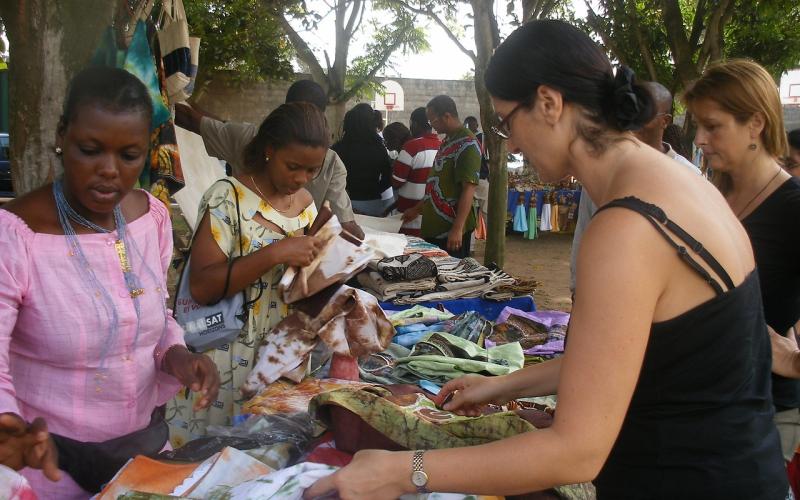
In Nigeria, a traditional trade that has existed in one form or another for at least a millennium is now threatened with the prospect of collapse.
In April 2015, the Nigerian government lifted an import ban on foreign textiles that had been in place since 2010.[1] This ban had been intended to protect domestic textile producers from a world market in which their goods were becoming increasingly uncompetitive. Now, with the ban lifted, cheap textile imports from Asia are rapidly flooding the Nigerian market.
For Nigerian consumers, access to cheap imported textiles has provided some additional savings but has resulted in little change overall in a market that has already become oversaturated with inexpensive goods manufactured overseas – from China in particular. China has emerged as Nigeria’s largest trading partner, with bilateral trade between the two countries currently valued at more than $20 billion, roughly double the value of US-Nigerian trade.[2]
Amidst the influx of cheap Chinese textiles, local Nigerian manufacturers have struggled to keep pace. Factory closings have left thousands of former textile workers jobless. Over the last two decades, the number of Nigerians employed by the textile industry has fallen by more than 95 percent.[3]
Domestic textile manufacturing, once a source of national pride for Nigeria, has been in decline since the 1990s.[4] Now, given the dominance of cloth and fabrics produced abroad, there appears to be little chance of revival for the country’s textile manufacturers.
The decline of Nigeria’s textile industry has proven to be a sore spot given the long history of cloth production in the country, as well as textiles’ association with Nigeria’s cultural heritage. Archaeologists have uncovered evidence of cloth production among Nigeria’s Igbo people dating as far back as the ninth century CE.[5] Cotton has been farmed and processed in Nigeria continuously for over a millennium, resulting in the development of a substantial array of distinct textiles patterns and designs with strong cultural associations.
For much of the country’s history, cloth production occurred on a small scale, often within a family’s home and using locally available materials and dyes. The spread of Islam to West Africa connected Nigeria to new markets across the Middle East, Europe, and beyond. This contact led to increased demand for Nigerian cloth, and contributed to the establishment of the textile industry.
Thanks to an abundance of locally-available cotton and Indigo, Kano, the second-largest city in the country and the commercial center of northern Nigeria, became the major regional manufacturing hub for textiles on an industrial scale. Kano’s dye pits – hundreds of large manmade craters carved into the ground for the purpose of saturating cotton with indigo pigment – once processed cloth in great quantities for both domestic use as well as for export via the Hausa networks that linked the city to faraway markets.
In the pre-colonial period, Kano stood out as one of the most economically productive cities in all of West Africa. Now, the vast majority of the dye pits lie abandoned. These pits, some of which are up to 500 years old, might have become a tourist attraction for Kano rather than falling into disuse were it not for the Boko Haram insurgency which now targets the city.[6] Without a practical purpose, the pits have become receptacles for waste and are gradually filling with earth and refuse.
As Nigeria’s legacy of textile production fades into history, questions about the country’s economic future abound. Nigeria’s economy today has been extensively shaped by the petroleum industry, which has introduced significant wealth into the country – wealth that has not been effectively distributed among the population, contributing to extensive socioeconomic inequality.[7]
In practical terms, the loss of textile jobs alone in Nigeria is not likely to have a significant impact in a county of more than 175 million people. As a whole, however, the manufacturing industry in Nigeria now must confront the existential threat posed by cheap foreign imports. If Nigeria’s factories and workshops cannot compete with global prices, more job loss and reduced income is inevitable, and progress towards development will be hindered substantially.
Nigeria’s economy is not necessarily lacking in diversity – at least not to the same extent as some of its neighbors. The country’s services sector, according to government estimates, accounts for 55% of GDP, followed by manufacturing which accounts for 26% of GDP, then agriculture which accounts for 18% (figures rounded).[8]
Although the oil industry in Nigeria contributes just 14% of the nation’s GDP,[9] the sale of crude oil provides approximately 75% of all government revenue.[10] With world oil prices at their lowest levels since 2009, and with Nigerian oil production expected to peak imminently,[11] the country faces the prospect of a severe lack for funding for public services if the government is unable to diversity its income sources. The loss of textile production and other industries will make it more difficult for Nigeria to collect sufficient taxes from businesses, and may increase the tax burden on individuals instead.
China, for its part, seems to be investing in a long-term trade relationship with Nigeria despite the effects that its imports are having on local producers. China has financed dozens of development projects including power plants, rail networks, roads, and telecommunications systems.[12] In coming years, with cheap goods continuing to flow into Nigeria’s markets, these infrastructure improvements may only enhance China’s ability to sell to Nigeria, rather than enhancing Nigeria’s capacity for domestic production and export.
By Joshua Kruskal
[1] http://www.reuters.com/article/nigeria-imports-idUSLDE6AT1RH20101130
[2] http://www.cnbcafrica.com/news/special-report/2014/04/23/china-africa-trade-grows-tenfold-in-a-decade/
[3] http://www.nytimes.com/2015/12/06/business/international/in-nigeria-chinese-investment-comes-with-a-downside.html?_r=0
[4] http://agoa.info/news/article/4836-textiles-nigeria-dying-goldmine.html
[5] http://africaunchained.blogspot.com/2015/06/nigerian-design-patterns-akwete.html
[6] http://www.bbc.com/news/business-25919537
[7] http://country.eiu.com/article.aspx?articleid=1432272327&Country=Nigeria&topic=Politics
[8] http://www.nigerianstat.gov.ng/nbslibrary/economic-statistics/gross-domestic-product
[9] http://www.cnbcafrica.com/news/western-africa/2014/04/11/a-closer-look-a-nigerias-gdp-rebasing/
[10] https://www.eia.gov/beta/international/analysis.cfm?iso=NGA
[11] http://www.theguardian.com/environment/earth-insight/2014/may/09/behind-rise-nigeria-boko-haram-climate-disaster-peak-oil-depletion
[12] http://mgafrica.com/article/2015-09-18-multi-billion-dollar-deals-chinas-27-biggest-active-projects-in-africa

